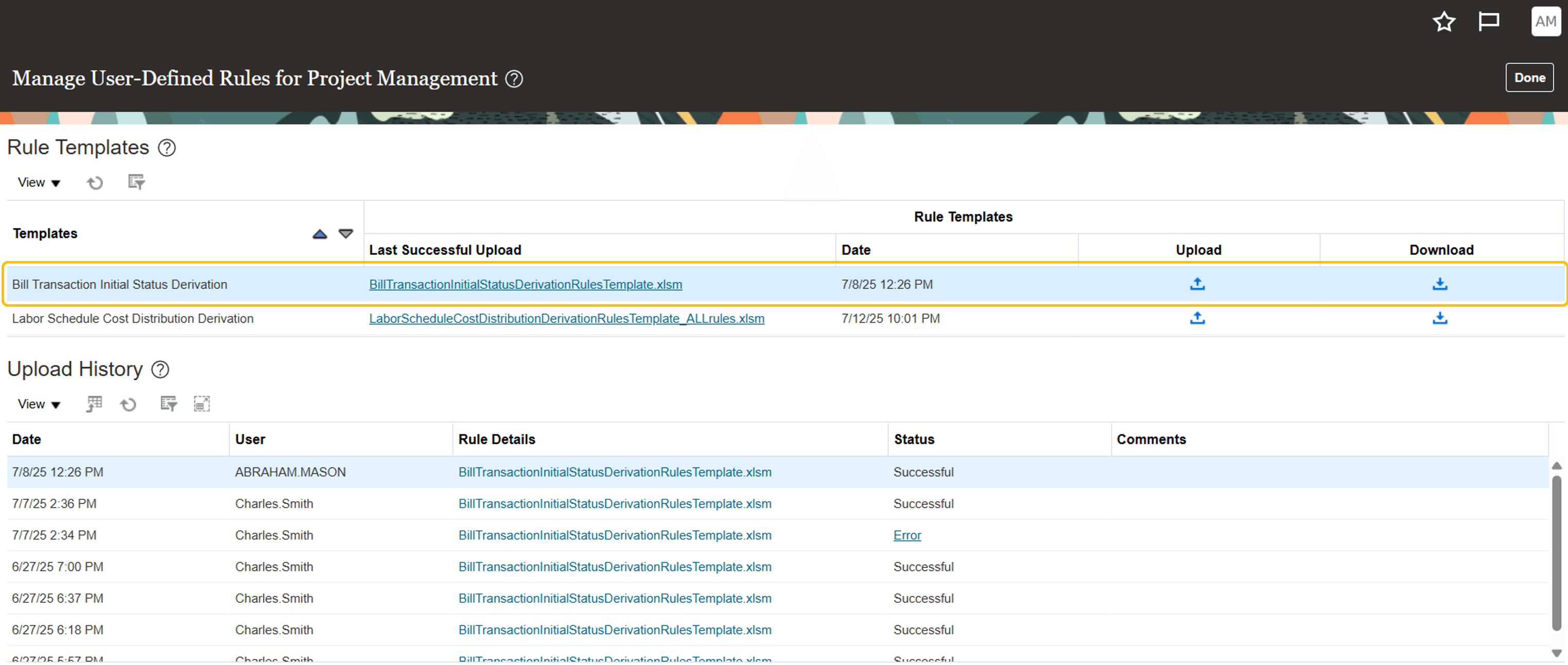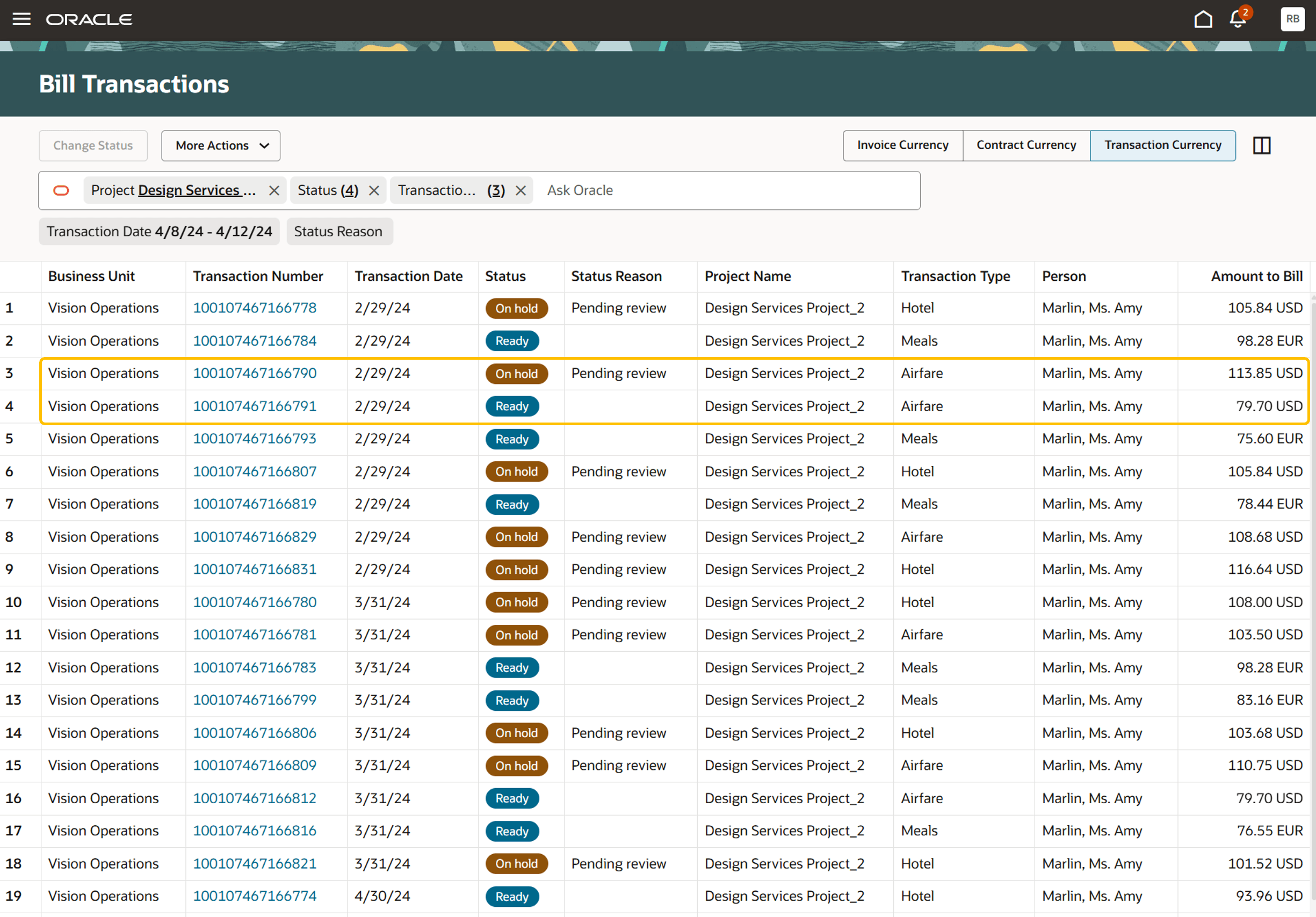Configurable Bill Transaction Initial Status Derivation Rules
Improve efficiency and control by enabling project teams to focus on reviewing specific types of unbilled transactions, aligned with business process needs. Project application administrators can define flexible business rules that automatically place specific bill transactions on billing hold. Project teams can then review, adjust, and release those transactions using the Bill Transactions page. This process ensures project teams review unbilled transactions only by exception, allowing the remaining transactions to be added to invoices without delay.
Worked Example
Vision Enterprises is a company that delivers professional services to its clients through projects. It's company policy that within the Vision Operations business unit all expenses with a billable value over $100 must be reviewed by the project manager before being billed to clients.
A project application administrator uses the new Manage User-Defined Rules for Project Management task to configure business rules which derive the initial status of bill transactions (unless there is a rule to the contrary, bill transactions are created in a 'Ready' to bill status).

A screenshot of the new Manage User-Defined Rules for Project Management page
The administrator downloads the Bill Transaction Initial Status Derivation template, defines rules as per business requirements, and uses the template to generate a rule file.

A screenshot of the new Bill Transaction Initial Status Derivation template
The administrator uploads the rule file using the same Manage User-Defined Rules for Project Management task.
When new project expenses are incurred with a billable value exceeding $100, the corresponding bill transaction is set to 'On hold' status, with a status reason of 'Pending review'. The project manager (or another suitably privileged user) can filter, review and adjust the transactions using the Bill Transactions page, and when satisfied, change the status of the transactions that are pending review to 'Ready' (to bill).

A screenshot of the Bill Transactions page, showing transactions placed on hold by the user-defined rules
The business benefits are:
- Project teams can review unbilled transactions by exception, as per business process requirements, allowing unexceptional transactions to be invoiced without delay.
- Business rules can be defined based on the billable value of cost transactions, whereas cost transaction approvals are only in the context of the cost amount.
Steps to Enable and Configure
While there are no steps required to enable bill transaction initial status derivation rules to be defined, the rules will only take effect if the following previously released opt-ins are enabled:
- Bill Transaction Creation on Cost Import (23C) - Automatically creates and maintains bill transactions for billable project costs and billing events.
- Redwood User Experience for Managing Unbilled Transactions (25B) - Enables users to review, adjust, and change the status of bill transactions.
NOTE: If you're opting in to the above features for the first time then please read the corresponding What's New documents which outline changes in functionality.
Tips And Considerations
- Text-based attribute values specified in rule conditions are applied using the equals operand; for example, Cost Classification = Expense Reports.
- Attribute values specified in rule conditions are converted to internal identifiers when rule files are uploaded. However, the task export functionality in Setup and Maintenance does not convert internal identifiers back to their corresponding attribute values. As internal identifiers can vary between environments, it's recommended to upload rule files to new environments, instead of using task export/import functionality in Setup and Maintenance.
- Attribute values specified in rule conditions are case-sensitive.
- Use the Insert Row action in Excel to ensure that any new rows are handled properly by the macros in the template.
Key Resources
- Similar Excel templates can be used to configure approval rules, such as Payables invoice approval. While templates for approval rules are not identical to the template delivered by this feature, the documentation may still be useful and can be found in the Manage Workflow Rules Using a Spreadsheet topic of the Implementing Common Features for Financials and Project Management guide.
Access Requirements
You need the following privilege(s) to use this feature:
- Manage User-Defined Rules for Project Management (PJF_MANAGE_USER_DEFINED_RULES_PRIV)
Note that this privilege provides access to manage all rule templates within the Project Management suite of applications.